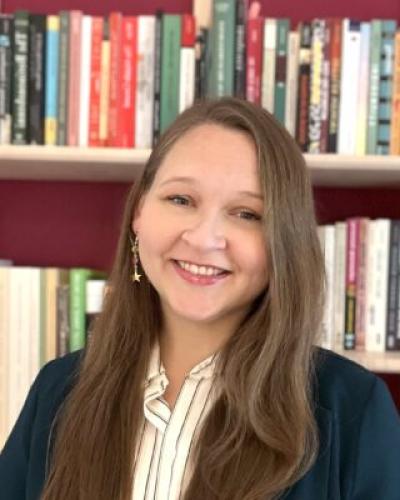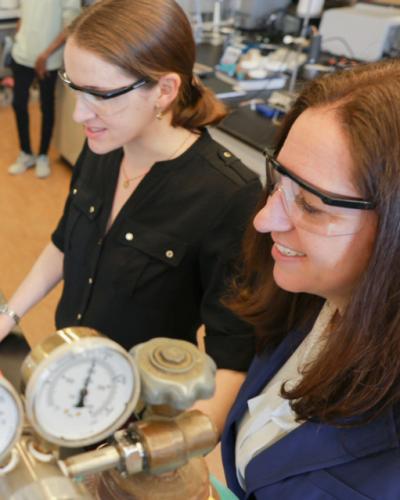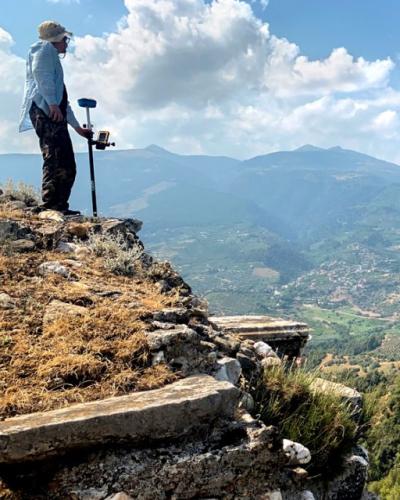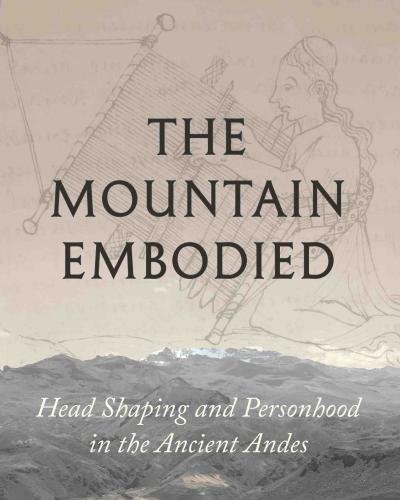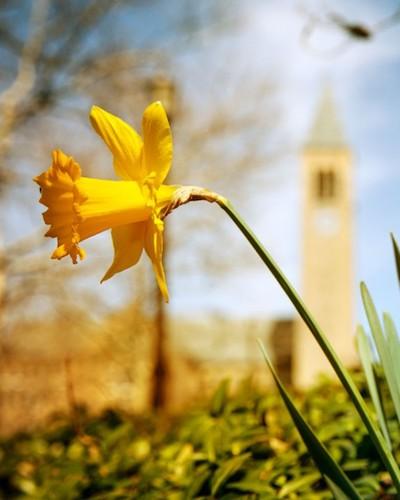See all of the ARKEO course offerings for Fall 2021 on our courses page.
Featured Undergraduate Courses: Fall 2021
ARKEO 1200
Ancient Peoples and Places
Day/time: TR 9:40am - 10:55am
Mode: In person
Instructor: John Henderson
A broad introduction to archaeology-the study of material remains to answer questions about the human past. Case studies highlight the variability of ancient societies and illustrate the varied methods and interpretive frameworks archaeologists use to reconstruct them. This course can serve as a platform for both archaeology and anthropology undergraduate majors.
ARKEO 1702
Great Discoveries in Greek and Roman Archaeology
Day/time: WF 1:00pm - 2:15pm
Mode: In person
Instructor: Caitlin Barrett
This introductory course surveys the archaeology of the ancient Greek and Roman Mediterranean. Each week, we will explore a different archaeological discovery that transformed scholars' understanding of the ancient world. From early excavations at sites such as Pompeii and Troy, to modern field projects across the Mediterranean, we will discover the rich cultures of ancient Greece and Rome while also exploring the history, methods, and major intellectual goals of archaeology.
ARKEO 2010
Archaeology of the Ancient Near East
Day/time: MW 1:00pm - 2:15pm
Mode: In person
Instructor: Lori Khatchadourian
The Near East is often defined by "firsts": the first cities, writing, and complex societies. Archaeology has long looked to the region for explanations of the origins of civilization. The Middle East has also long been a place where archaeology and politics are inextricably intertwined, from Europe's 19th century appropriation of the region's heritage, to the looting and destruction of antiquities in recent wars in Syria and Iraq. This introductory course moves between past and present. It offers a survey of 10,000 years of human history, from the appearance of farming villages to the dawn of imperialism, while also engaging current debates on the contemporary stakes of archaeology in the Middle East. Covering Iraq, Syria, Turkey, Iran, and the Caucasus, our focus is on past material worlds and the modern politics in which they are entangled.
ARKEO 2245
Health and Disease in the Ancient World
Day/time: MWF 10:10am - 11:00am
Mode: In person
Instructor: Matthew Velasco
The history of humankind is also a history of health and disease; the rise of agricultural societies, ancient cities, and colonial empires had wide-ranging effects on diet and nutrition, the spread of infectious diseases, and occurrence of other health conditions. This history has also been shaped by complex interactions between environment, technology, and society. Using archaeological, environmental, textual, and skeletal evidence, we will survey major epidemiological transitions from the Paleolithic to the age of European conquest. We will also examine diverse cultural experiences of health, illness, and the body. How do medical practices from pre-modern societies, such as the medieval Islamic world and the Inca Empire, challenge dominant narratives of scientific development? The implications of past health patterns for modern-day communities will also be explored.
ARKEO 2700
Introduction to the Classical World in 24 Objects
Day/time: MW 2:45pm - 4:00pm
Mode: In person
Instructor: Annetta Alexandridis
Parthenon Marbles to Greece? Come and explore all these questions and more in "An Introduction to the Ancient World in 24 Objects". Each class will focus on a single artefact, showing how it is exemplary of key trends and historical moments in Greek and Roman culture, from the temples of ancient Athens to the necropoleis of Roman Egypt and the rainy outposts of Hadrian's Wall. In addition to the history of Greco-Roman art in antiquity, we will explore the influence of Classical art on later Western culture, paying special attention to its complex (and often problematic) political ramifications. While focusing on major monuments from Classical antiquity in class, we will also examine Cornell's collection of plaster casts, ancient objects in the Johnson Museum, and the Greek and Roman collections in the Metropolitan Museum of Art in New York.
ARKEO 2711
Archaeology of the Roman World: Italy and the West
Day/time: TR 11:25am - 12:40pm
Mode: In person
Instructor: Astrid Van Oyen
With megacities, long-distance trade, and fluid identities, the Roman empire can seem uncannily close to our modern world. This course adopts a thematic approach to explore whether this is a valid parallel, based on archaeological evidence ranging from temples to farms, from wine containers to statues.
ARKEO 3030
Community Engagement in Archaeology
Day/time: TR 1:00pm - 2:15pm
Mode: In person
Instructor: Maia Dedrick
Meaningful community-engaged archaeology has the potential to transform the discipline. Increasingly, archaeologists engage intentionally with communities, through education and outreach but also through partnerships and collaboration that entail real power sharing over archaeological research and historical preservation. These developing practices contrast with disciplinary histories that stressed extraction of information and materials and a protective stance toward cultural heritage. In this class, we address such histories and have the opportunity to learn about the methods, concepts, and issues encompassed within Indigenous archaeology; archaeological research with descendant, diasporic, and "ethical" communities; participatory and applied research; and communication to broad public audiences. With greater potential relevance outside the academy, engaged archaeology can attract diverse constituents into disciplinary conversations and improve research practices.
ARKEO 3090
Introduction to Dendrochronology
Day/time: W 12:25pm - 1:15pmMode: In person
Instructor: Sturt Manning
Introduction and training in dendrochronology (tree-ring dating) and its applications in archaeology, art history, climate and environment through lab work and participation in ongoing research projects using ancient to modern wood samples from around the world. Supervised reading and laboratory/project work. Possibilities exists for summer fieldwork in the Mediterranean, Mexico, and New York State.
ARKEO 3566
Art and Architecture of the Pre-Columbian Americas
Day/time: MW 9:40am - 10:55am
Mode: In person
Instructor: Ananda Cohen-Aponte
This course introduces students to the arts of the ancient Americas from circa 2000 BC to the Spanish invasions of the 15th and 16th centuries. The inhabitants of the Americas produced outstanding works of art and architecture that showcased their diverse aesthetic contributions. This course covers the arts of indigenous Mesoamerica (Mexico, Guatemala, Belize, and Honduras), the Caribbean (Cuba, Puerto Rico, Dominican Republic, and the Greater and Lesser Antilles), and Andean South America (Ecuador, Peru, Bolivia, and Chile). Students will become familiar with the history, archaeology, and visual arts of the earliest cultures that populated these regions up through the Inca, Aztec, and Maya cultures that encountered the Spaniards. This course will also explore the legacies of pre-Columbian art in colonial, modern, and contemporary Latin America.
ARKEO 3600
Pre-Industrial Cities and Towns in North America
Day/time: TR 2:45pm - 4:00pm
Mode: In person
Instructor: Sherene Baugher
Various American Indian civilizations as well as diverse European cultures have all exerted their influences on the organization of town and city living. The course considers how each culture has altered the landscape in its own unique way as it created its own built environments.
ARKEO 4020
Designing Archaeological Exhibits
Day/time: MW 7:30pm - 8:45pm
Mode: In person
Instructor: Sherene Baugher
Students will learn method and theory on museum design and curation. The course also provides hands-on experience in designing and building exhibits for State Parks in the Finger Lakes. For the outreach component, students will work with staff from State Parks and Friends of the Parks.
ARKEO 4030
The Caucasus: Captives, Cultures, Conflicts
Day/time: W 9:05am - 11:00am
Mode: In person
Instructor: Lori Khatchadourian
The Caucasus occupies a distinctive place within both the ancient and modern imagination. It is a region long anchored to tropes of disobedience, punishment, and redemption. It is also a place in which liminality, betwixt and between Europe and Asia, endures as both a perceived geographic imaginary and an experienced condition in the detritus of imperialisms past. The Caucasus's extraordinary diversity in languages and ethnicities has generated a deep suspicion of it by those surrounding the region, and has sparked profound social tragedies. But it has also stimulated a curiosity that has generated meditations on culture, identity, and social life. This course explores the Caucasus through its archaeology, anthropology, history, literature, music, and film. We will examine the entanglement of the region's history with its internal and external representations in order to get a sense of the array of forces shaping the Caucasus today.
ARKEO 4225
The Prehistory of Power: Archaeological Visions of the Political
Day/time: F 9:05am - 11:00am
Mode: In person
Instructor: Adam Smith
This seminar examines the prehistory of power as seen in archaeological approaches to political life. We will consider the impact of political theory on archaeology and the reverberations of archaeological research upon modern regimes and revolutions. Our focus will be on a critical analysis of the central concepts orienting archaeologies of the political, including complexity, civilization, authority, sovereignty, and power. Readings will draw broadly from a global set of cases in order to provide a foundation for comparison. We will engage with theory from both within archaeology and outside it in order to establish the broad inter-disciplinary parameters for investigations of the prehistory of power. And we will also consider the power of archaeology itself to shape political action in the contemporary moment.
ARKEO 4227
Embodiment of Inequality: A Bioarchaeological Perspective
Day/time: W 2:40pm - 4:35pm
Mode: In person
Instructor: Matthew Velasco
Critical approaches to embodiment compel bioarchaeologists to consider how social norms and institutional inequalities are enacted and materialized through the body. This course contributes a deep archaeological perspective on the lived experience of inequality and the historically contingent nature of sexuality, gender, and violence. Drawing upon the study of human skeletons, social theory, and a rich comparative literature in cultural anthropology, we will theorize bones as once-living bodies and explore topics such as body modification and mutilation, masculinity and performative violence, gender and sexual fluidity, and sickness and suffering in past societies. We will not only consider privilege and marginalization in lived experience, but also in death, examining how unequal social relationships are reproduced when the dead body is colonized as an object of study.
ARKEO 4254
Themes in Mediterranean Archaeology
Day/time: M 11:20am - 2:20pm
Mode: In person
Instructor: Caitlin Barrett
This seminar provides a higher-level general introduction to, and survey of, contemporary theories, methods, and approaches in the archaeology of the Mediterranean world. Rather than focusing on a specific geographical sub-region or chronological period, this course examines and critically assesses the practice and distinctive character of Mediterranean archaeology more broadly. The course is intended for senior undergraduates with some previous background in archaeology, Classics, Near Eastern Studies, or related fields.
ARKEO 4256
Time and History in Ancient Mexico
Day/time: M 9:05am - 11:00am
Mode: In person
Instructor: John Henderson
An introduction to belief systems in ancient Mexico and Central America, emphasizing the blending of religion, astrology, myth, history, and prophecy. Interpreting text and image in pre-Columbian books and inscriptions is a major focus.
ARKEO 4263
Zooarchaeological Method
Day/time: TR 9:40am - 10:55am
Mode: In person
Instructor: Nerissa Russell
This is a hands-on laboratory course in zooarchaeological method: the study of animal bones from archaeological sites. It is designed to provide students with a basic grounding in identification of body part and taxon, aging and sexing, pathologies, taphonomy, and human modification. We will deal only with mammals larger than squirrels. While we will work on animal bones from prehistoric Europe, most of these skills are easily transferable to the fauna of other areas, especially North America. This is an intensive course that emphasizes laboratory skills in a realistic setting. You will analyze an assemblage of actual archaeological bones. It is highly recommended that students also take the course in Zooarchaeological Interpretation (ANTHR 4264/ARKEO 4264) offered in the spring.
ARKEO 4644
Globalism and Collapse in the Late Bronze Age World
Day/time: T 8:30am - 11:00am
Mode: In person
Instructor: Christopher Monroe

